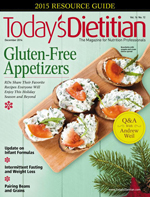
December 2014 Issue
Infant Formula Innovations
By Judith Riddle
Today's Dietitian
Vol. 16 No. 12 P. 4
Many nutrition professionals believe that breast milk is the best food choice for infant and toddler nutrition over commercial formula. In fact, many dietitians encourage clients and patients to breast-feed if possible. Based on much research demonstrating the health benefits of breast-feeding for both mother and baby, The American Academy of Pediatrics "reaffirmed its recommendation of exclusive breastfeeding for about 6 months, followed by continued breastfeeding as complementary foods are introduced, with continuation of breastfeeding for 1 year or longer as mutually desired by mother and infant," according to its journal.
Breast milk contains hundreds, even thousands of distinct bioactive molecules that protect against infection and inflammation and contribute to immune system maturation, organ development, and healthy microbial colonization, which infant formula simply can't provide, according to a study published in the February 2013 issue of Pediatric Clinics of North America. The article goes on to indicate that human milk isn't just merely nutrition, but real medicine that has "a profound role in infant survival and health." Breast milk can protect against bacteremia, diarrhea, respiratory tract infection, necrotizing enterocolitis, otitis media, childhood overweight and obesity, type 1 and type 2 diabetes, lymphoma, leukemia, and Hodgkins disease, among other illnesses.
But while breast milk may be superior to infant formula, commercial formula has come a long way in providing the much-needed nutrition that healthy infants and those with various health issues need.
The many types of formulas available include those that are cow's milk-based, lactose-free/low-lactose milk-based, soy protein-based, extensively hydrolyzed, and specialty formulas for babies with metabolic disease, intestinal malformations, and other conditions.
To learn more about the advances and innovations in commercial formulas, the specific products available, and strategies to better counsel clients and patients, read the feature article "Update on Infant Formulas" on page 32. Be sure to read the other articles on gluten-free appetizers for celebrating the New Year, the health benefits of pairing beans and whole grains, and our exclusive Q&A with acclaimed nutrition and health expert Andrew Weil, MD. Please enjoy the issue!
